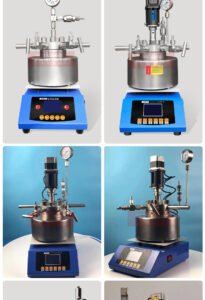Miniature glass reactors are indispensable tools in research laboratories that demand controlled environments for chemical synthesis, material testing, and temperature-sensitive experiments. These compact systems offer an effective balance between precision and efficiency, facilitating complex operations in fields like pharmaceuticals, materials science, and petrochemistry.
Among the most versatile products in this category is the AKF-5L Double Jacketed Glass Reactor offered by Equilrxnlab, a trusted name in laboratory equipment innovation. In this article, we examine the essential characteristics, scientific relevance, and technical specifications of miniature glass reactors, with a focus on the AKF-5L model.
The Science Behind Miniature Glass Reactors
Miniature glass reactors provide an enclosed system for precise thermal and mechanical control of chemical reactions. Their transparent design allows real-time observation of internal changes, which is crucial during synthesis and crystallization processes. The use of borosilicate glass ensures chemical resistance and thermal stability, while the compact design supports operations in space-limited labs.
The keyword miniature glass reactor represents more than just a downsized vessel—it symbolizes a high-precision tool that allows researchers to simulate large-scale processes in a small, manageable format. These reactors enable temperature ranges as broad as -120°C to 300°C, offering experimental flexibility in exothermic and endothermic studies alike.
Key Features of the Equilrxnlab AKF-5L Miniature Glass Reactor
The Equilrxnlab AKF-5L miniature glass reactor is engineered for high-performance and reproducibility. It includes:
- Material Capacity: 5 liters, suitable for benchtop scale synthesis
- Jacket Capacity: 2 liters for external cooling/heating circulation
- Temperature Range: -120°C to 300°C for wide thermal control
- Customizable Ports: 5 ports to accommodate probes, condensers, or inert gas input
- Stirring Mechanism: Fluorine-coated stainless steel stirrer for corrosion resistance
- Reactor Dimensions:
- Cover Diameter: 260 mm
- Inner Cylinder Diameter: 220 mm
- Outer Cylinder Diameter: 230 mm
- Vessel Height: 430 mm
- Speed Range: 0–1350 rpm for adjustable agitation
- Sensor System: PT100 temperature probe for accurate thermal measurement
- Constant Pressure Funnel: 2-liter capacity for safe reagent addition
This unit exemplifies the innovation Equilrxnlab integrates into every product, combining utility with scientific rigor.
Applications of Miniature Glass Reactors in Research
A miniature glass reactor serves various laboratory needs across disciplines. Its versatility is particularly valued in:
1. Pharmaceutical Formulation
Drug development often involves multi-step reactions that must be precisely monitored and replicated. A 5-liter reactor is ideal for batch testing, stability analysis, and polymorph screening under strict thermal control.
2. Polymer Synthesis
Miniature reactors are instrumental in polymer chemistry, where temperature sensitivity and controlled addition of monomers are critical. The AKF-5L reactor’s customizable ports allow integration of in-line viscosity sensors or molecular weight monitors.
3. Nanotechnology and Material Science
For nanoparticle synthesis or surface functionalization, a miniature glass reactor enables accurate dosing and homogenous mixing. The PT100 sensor and adjustable stirring range provide stability required in these sensitive experiments.
4. Catalysis Research
Miniature reactors are useful in kinetic studies of heterogeneous and homogeneous catalysis. The visibility and thermal range of the AKF-5L model facilitate real-time observation of reaction intermediates and phase changes.
Design Considerations for Enhanced Performance
Equilrxnlab’s AKF-5L reactor is designed with operational efficiency and user safety in mind. Its double-jacketed configuration allows external thermal fluid circulation, supporting controlled heating or rapid cooling. The fluorine coating on the stirring shaft resists corrosion, minimizing contamination risks and extending instrument longevity.
Moreover, the reactor’s modular build supports expansion with vacuum filtration devices, reflux condensers, or low-temperature circulation systems. These features align with Equilrxnlab’s full catalog of compatible lab instruments, creating a seamless workflow for researchers.
Why Equilrxnlab Leads in Laboratory Innovation
The success of any experimental setup depends heavily on the precision and reliability of its equipment. Equilrxnlab has consistently provided products that meet the high standards of academic and industrial laboratories. Their AKF-5L model is a reflection of thoughtful engineering and field-specific feedback integration.
Users can explore more offerings through their official channels:
- YouTube: Demonstrations and setup guides
- Instagram: Visual insights into product usage
- Facebook: Community updates and customer stories
- Contact Page: Inquiries and technical support
These platforms also provide user interaction, allowing for troubleshooting, consultation, and continuous education on reactor system advancements.
Optimizing Reactor Performance Through System Integration
When combined with ancillary equipment like low-temperature cooling circulators, vacuum pumps, or reflux modules, a miniature glass reactor transforms into a complete reaction station. This integration optimizes thermal efficiency, minimizes energy consumption, and enhances experiment repeatability.
The jacketed design plays a crucial role in this optimization. Coolants or heating media pass through the 2-liter jacket, ensuring uniform temperature distribution. This prevents localized heating or cooling spots, which can compromise yield and reproducibility.
Moreover, the five customizable ports allow for real-time reaction sampling, gas purging, or in situ spectroscopy, depending on experimental needs.
Impact on Experimental Accuracy and Reproducibility
Reproducibility remains a cornerstone of scientific integrity. The AKF-5L’s precision mechanisms—including the PT100 sensor and adjustable stirring speeds—ensure consistency across batches. The 0–1350 rpm stirring range supports diverse viscosities, from aqueous solutions to semi-solid slurries.
Researchers can confidently replicate results or scale processes, knowing that the miniature glass reactor provides stable conditions.
Final Reflections on the Scientific Value of Miniature Glass Reactors
The use of miniature glass reactor systems is now fundamental in experimental chemistry. They serve as testbeds for hypothesis validation, formulation development, and reaction optimization. The AKF-5L model by Equilrxnlab distinguishes itself not just by technical specification but by enabling a deeper understanding of reaction dynamics.
Its precision components, user-friendly design, and adaptability make it a reliable platform for conducting controlled experiments. With tools like these, researchers can spend more time analyzing data and less time troubleshooting equipment.
Professionals seeking long-term value from lab investments will find the AKF-5L Double Jacketed Glass Reactor to be an essential addition to their experimental toolkit. For detailed consultation or integration suggestions, visit Equilrxnlab’s contact page.




